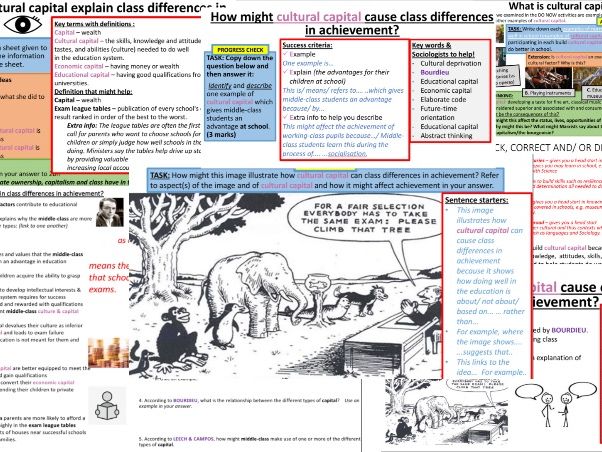AQA GCSE Sociology: Education - Class differences in educational achievement BUNDLE
**L1 Material deprivation: **
Covers the following key terms: Class differences in educational achievement, Educational achievement, External factors (home factors), Internal factors (school factors), Social class
Covers the following sociologists: Halsey, Heath, Ridge (1980)
Key term and definition sheet for the lesson included
ANSWERS TO ALL ACTIVITIES INCLUDES
Teaching to all activity included
Makes references to key terms students should know.
Promotes a spiral curriculum by making links to key terms that students might have previously been taught that link to this lesson.
RESOURCES CAN BE FOUND AT THE END OF PPT
**L2 Cultural deprivation: **
Detailed lesson with lots of scaffolding based on adaptive teaching that help students understand
Cover the following key terms:
Material factors
Cultural factors
Cultural deprivation
Speech code
The elaborate code
The restricted code
Subculture
Immediate gratification
Deferred gratification
Collectivism
Individualism
Fatalism
Present-time orientation
Future orientated
Key terms you should already know that link:
Class differences in achievement
Educational achievement
External achievement
External factors
Internal Factors
ANSWERS TO ALL MAIN ACTIVITIES INCLUDED
RESOURCES CAN BE FOUND AT THE END OF PPT
Teaching to all technique included
**L3 Cultural capital: **
Detailed lesson with lots of scaffolding based on adaptive teaching that help students understand the three types of identified by Bourdieu. Students will also be able to explain the role of cultural capital in causing class differences in achievement.
Two plenaries to choose from
Exam style question
Student friendly mark scheme
Cover the following key terms: Cultural capital
Educational capital
Economical capital
Selection by mortgage (extension)
Covers the following sociologists:Bourdieu, Sugarman, Leech and Campos (extension), KEDDIE, BLACKSTONE AND MORTIMORE
Key terms you should know: Culture, Norms Values, Agency and agents of socialisation, Primary socialisation, Meritocracy
Resources can be found at the end of PPT
Some answers to activity are included
key term sheet for the lesson attached
**L4 Labelling: **
Detailed lesson with lots of scaffolding based on adaptive teaching that help students understand class differences in achievement.
Covers the following key terms: Labelling, Self-fulfilling prophecy/Pygmalion effect, the ‘Halo effect’
Covers the following sociologists: Becker, Rosenthal and Jacobson
Includes key term and definition sheet needed for the lesson.
Includes a discussion activity to promote oracy and engagement
includes a 3 marker and detailed scaffolding to help students answer it.
Also includes a student-friendly marker for self or peer assessment.
ANSWERS FOR MOST ACTIVITIES INCLUDED
Promotes a spiral curriculum by making links to key terms that students might have previously been taught that link to this lesson.
Resources can be found at the end of the PPT.
**L5 Banding (Setting & Streaming):**
Detailed lesson with lots of scaffolding based on adaptive teaching that help students understand class differences in achievement (setting and streaming)
Covers the following key terms: Banding, Setting, Streaming, Mixed-ability class
Covers the following sociologists: Ball
Includes a starter activity that recaps content on class difference sin educational achievement that students should have covered so far and answers to these.
ANSWERS TO ALL ACTIVITIES INCLUDED
Includes a ‘teaching to all’ activity
Includes key term and definition sheet for the lesson
Promotes a spiral curriculum by making links to key terms that students might have previously been taught that link to this lesson.
**L6 Pupil subcultures:**
Detailed lesson with lots of scaffolding based on adaptive teaching that help students describe how setting might cause pupils to form pupil subcultures. To explain how pupil subcultures might explain class differences in achievement . Students will also be able to analyse and evaluate pupil subculture as an explanation for class differences in achievement
Cover the following key terms: pro-school subcultures, anti-school subcultures/counter-cultures
Covers the following sociologists: Willis
ANSWERS TO SOME MAIN ACTIVITIES INCLUDED .
key terms students should know: Banding, setting, pupil subculture, Norms, Values
RESOURCES CAN BE FOUND AT THE END OF PPT

